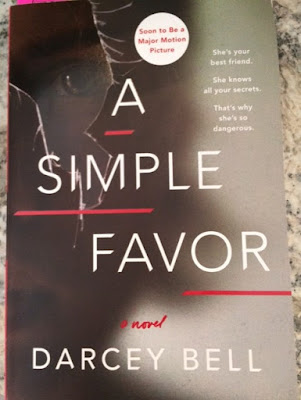Genre: Thriller
Published: 2017
Pages: 298
Wealthy PR director Emily and mommy blogger Stephanie are best friends. So when Stephanie goes to pick up Emily's son from school, she thinks nothing of it. But then Emily disappears, and Stephanie finds herself filling in to help take care of Emily's family. Maybe there was more to this "friendship" that she realized.
But is Emily really gone for good? Or does she have bigger plans? That's what she thought at first. But unfortunately, plans go wrong, and soon her original plot becomes one to get revenge.
Reviewing a thriller is always challenging because there are details that shouldn't be revealed. But I shall try my best.
I'm going to warn you that you won't find many likable characters here. Stephanie disgusted me, especially in the first half of the book. She has affair after affair. She's a compulsive liar. When she meets her half brother, she meets him at a motel that same day. Yeah, her half brother, who's visiting to mourn the death of their father. I wondered for a while if she was the antagonist...but then we meet Emily. She's an odd character who is just intense and then whose thoughts suddenly stray from "wanting excitement" to wanting people killed...and then she shows some signs of remorse. Maybe. Seriously, she goes from stealing her mother-in-law's ring to wanting her husband dead. Boy, that escalated quickly...It's hard to know what to think of her. At first, both appear to be decent people. They have families and kids they adore. Of course, Stephanie has her secrets but ultimately the subplots about her dad and half brother really didn't contribute to the story. (Sigh. More moping about missing fathers.) Come to think of it, Emily was also supposedly estranged from her parents, but I don't recall learning why.
A lot of side characters border on cliche, though. There's the housekeeper-who's Spanish of course-and frequently inserts Spanish words into her speech, particularly "senora" for "woman." Really? There's also incompetent law enforcement and a victim who's way too trusting for her own good- perhaps to move the plot along. This book could have ended very easily if she had just used common sense. Then there's Emily. She's rich and successful but is also unsatisfied. Oh, and then there's a secret twin. If you've read the genre you've probably seen a lot of this before. And of course, we watch Stephanie move in to Emily's to "help out" with her son Nicky. It's not hard to guess what comes of this.
The story itself was the strongest part. Three different characters have a chance to speak- Stephanie, Emily, and Emily's husband Sean. There are also some of Stephanie's blog entries in the mix. They serve to give you a feel of Stephanie's blogging lifestyle, but other characters also read it and use it in ways to evaluate their own lives. Stephanie isn't a traditional mommy blogger who writes pages of sponsored posts- actually, I don't know many mommy bloggers who straight-up blog about their lives like she does. Either way, it's interesting and an important vehicle to drive the plot forward. And refreshing- I don't like how commercial blogging is becoming! The language of the blog did feel a little formal and poetic though.
I also liked the alternating POVs which allowed us to see things from lying characters' perspectives, leading to insanely unreliable narrators. You know what exactly is happening (if you're good with reading comprehension), but other characters do not. Of course since there's no real ending, the lies never get explained to them so nobody learns anything, or faces consequences. More on that in a bit. The idea was also well-thought out. I did find Sean's taking out a life insurance policy to be trite; same thing for the characters pointing out "oh look, this is just like a horror movie!" Eyes will roll.
But there are issues. Not too long ago I wrote a post on some of my biggest pet peeves in recent book trends. One of them, #4, was a vague ending. The lack of an ending can singlehandedly ruin a book for me. Otherwise, what is the point of the story? I read because I want to know what happens! And sometimes when you're reading and the pages are slowly dwindling and dwindling, you worry because there's not enough time to resolve anything.
This really bothered me because a lot of the truth had yet to be exposed to the victimized characters. Emily's husband didn't get much of an ending at all. Neither did Stephanie. There's all this buildup leading to the consequences of Emily's doing in their life, and then we don't get to find out what happens. As a matter of fact, I don't think either of them ever found out the truth. I'm sick of authors deciding to leave us high and dry just so they can convey an artsy feeling of foreboding. Judging by her picture, it looks like Bell may be a hipster, so that may very well have been the effect she wanted. I don't know. I like closure in my books. And an ending. When I buy a novel, I trust the author to tell me what happens. It's not a fill-in-the-blank writing prompt book.
That said, the ending is somewhat exciting. Unfortunately it's basically stolen from a famous movie (which I knew before the author explicitly pointed this out. Again, eyes will roll). Still, most of the subplots don't go past the climax and that left me disappointed.



